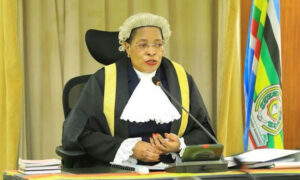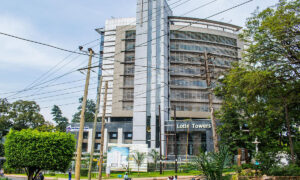The Session of Senior Officials of the 14th Meeting of the Sectoral Council on Foreign Policy Coordination was held on 22nd to 23rd April 2024 at Four Points by Sheraton in Dar Es Salaam, Tanzania, under the EAC Calendar of Activities covering January to June 2024.
Uganda’s official delegation to the meeting was composed of officials from the Ministry of Foreign Affairs, The Ministry of East African Community Affairs, Justice and Constitutional Affairs and the Uganda High Commission in Dar-Es-Salaam.
The purpose of the Meeting was to consider the Report of Experts Meeting on Foreign Policy Coordination held on 28th – 30th June 2022, the Concept Note on the development of the EAC Diaspora Policy and also to consider the Concept Note on the development of the EAC Regional Framework on Return and Reintegration of Stranded Migrants originating from EAC Partner States;
In her address to the delegates, the EAC Director for Social Sectors, Dr. Irene Isaka representing the Deputy Secretary-General for Productive Infrastructure, Social and Political Affairs welcomed the senior officials noting with concern that the 13th meeting was held in April 2015, but has thrice been rescheduled in different years. The meeting was therefore convened after a long hiatus.
Ms Isaka expressed appreciation to Partner States for demonstrating a commitment to participation in the 14th Meeting and address pertinent issues on foreign policy that have been pending for a long time.
“Holding subsequent meetings regularly in line with the EAC Calendar of Activities avoids delays in the implementation of Sectoral Council imperatives,” she said. She further noted that holding the Sectoral Council Meetings alongside the Joint Sectoral Council allows for cross-cutting Foreign Policy issues to be deliberated upon in the Joint Sectoral Council meetings.
The Chairperson of the meeting Mr. John Chol Director of the Political, Security and Legal Committee of the Republic of South Sudan, in his remarks, thanked the Government of the United Republic of Tanzania for the extended hospitality and the efficiency of the Secretariat.
He expressed satisfaction at the robust participation by Partner States and hoped that outstanding issues in the Sector would be addressed by the meeting.
In presenting the concept Note on Development of an EAC Diaspora Policy, delegates were informed that diaspora remittances have continued to be a major source of external financing for Africa’s development, rising from $56.6 billion in 2010 to $73.7 billion in 2019 with the EAC share of this remittance constituting about 13.7% equivalent to USD 9,399,804,228 as at 2022.
In their consideration of the Concept Note, the delegates noted that Diaspora remittances have proven more resilient than other external resources, such as foreign direct investment, and tend to be counter-cyclical during economic downturns.
The meeting further noted that despite the volume of remittances received by Partner States, the cost of remitting is still high due to inadequate policy and legal frameworks in the region.
Delegates were of the view that the EAC must develop a Regional Diaspora Policy and strategy to enable Partner States to harmonise their national strategies and frameworks to maximize the benefits of the diaspora.
It was further acknowledged that there is a need to develop a regional approach to mobilize the EAC Diaspora to actively participate in the EAC integration process and the meeting directed the EAC Secretariat to develop a regional approach to harnessing the Diaspora’s potential to contribute to the socioeconomic transformation of the region.
In consideration of the concept note on the development of the EAC Regional Framework on Return and Reintegration of stranded migrants originating from EAC countries, the meeting was informed that The EAC region was registering “high volumes of migration flows into, out of, and within, driven by the effects of climate change, conflict, and deteriorating socio-economic conditions”.
The delegates expressed concern that a significant majority of migrants migrate irregularly with help from smugglers to countries in the region, Middle East, Southern Africa, and Europe.
And that while some arrive at their preferred destination and can secure formal or informal employment, many remain stranded in transit and host countries in vulnerable situations and exposed to various forms of protection risks, which often alters the course and outcomes of their migration.
The Session of Senior Officials concluded their 14th meeting by recommending several actions to the Session of Permanent Secretaries who, later this week, will in turn recommend to the Sectoral Council on Foreign Policy Coordination approval and the development of the EAC Regional Framework on Return and Reintegration of Stranded Migrants originating from EAC Partner States.




























